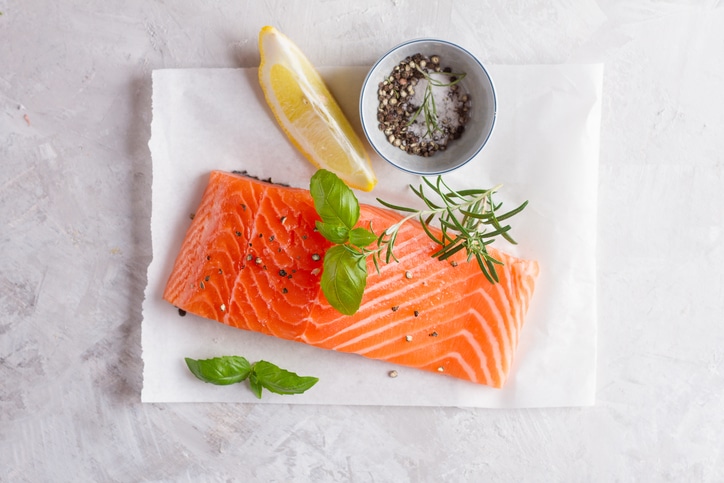For centuries, fish has been known as “brain food.” Now, an ongoing research project shows there is a scientific basis for this folklore.
Scientists at Rush University in Chicago have been studying the effects of seafood on the brain for over a decade. As part of the Rush Memory and Aging Project, they have been closely tracking 915 seniors since 1997.1
The researchers divided the participants into two groups. One group rarely ate seafood…less than once a week. The second group ate seafood once a week or more.
Every year, scientists tested each participant’s cognitive ability. When participants died, autopsies were performed to determine if they had Alzheimer’s or other brain abnormalities.
Seniors eating fish at least once a week had 10% slower memory loss than those who ate less seafood. Participants who ate fish two or more times a week saw even greater benefits. They slowed their memory loss by 13%.2
Eating seafood was also found to protect against Alzheimer’s. By eating fish once a week, subjects with a strong genetic risk for Alzheimer’s lowered their risk by 12.5%.3,4
Recommended for You: Fight Alzheimer’s From Your Kitchen
A fruit juice that eases Alzheimer’s symptoms in just 30 days… A grocery store treatment that’s reversed much of the disease’s damage in patients… Fact is, your kitchen could be a genuine Alzheimer’s clinic. Just ask Rose’s daughter and nurses. Rose had late stage AD. But instead of turning to drugs, her daughter found an exotic spice. And you have to see what happened next…
How Does Fish Protect Your Brain?
Martha Clare Morris is a senior researcher on the decade-long study. She says scientists don’t know for sure how seafood protects your brain. But they theorize that fish may replace the fatty acids we lose as we age.5
“As we age, we lose DHA in the brain,” Morris said. DHA stands for docosahexaenoic acid. It’s an omega-3 fatty acid that is a primary structural component of the brain. The best dietary source of DHA is fish.6
5 Worst Fish to Eat
Not all fish is created equal. Some varieties carry health risks due to antibiotics, mercury, and chemical residues. Here are the top five types of seafood to avoid:
- Imported catfish. It can contain antibiotics banned in the United States. Catfish in Asian countries is often raised in polluted water. Antibiotics are used to keep fish disease-free despite the dirty water.
- Imported shrimp. They often contain antibiotics, chemical residues, and disease-causing germs. A Consumer Reports test found that 60% of imported shrimp tested contained dangerous bacteria. These included salmonella, E. coli, and MRSA. About 94% of shrimp sold in the U.S. is farmed in Asia.
- Swordfish. This is a restaurant favorite. But swordfish is loaded with mercury.
- Chilean sea bass. Its white, flaky texture has made it popular. But like swordfish, it contains high levels of mercury.
- Bluefin tuna. Most varieties of tuna contain some mercury, but bluefin has the highest concentrations. It is most often served as sushi.
Other fish to avoid due to mercury content are king mackerel, orange roughy, shark, and tilefish. Steer clear of farmed eel. It often contains both polychlorinated biphenyls (PCBs) and mercury.
5 Best Fish to Eat
The best fish are those low in mercury and other chemicals, but high in healthy omega-3 fatty acids.
- Wild-caught salmon. Fresh, frozen, or canned versions are all among the healthiest types of fish.
- Sardines. They are low on the food chain, so they don’t accumulate mercury like predator fish.
- Anchovies. You can buy them fresh, frozen, or canned. Any type is low in mercury and high in omega-3s.
- Northern Atlantic mackerel. Unlike its cousin the king mackerel or kingfish, this mackerel is very low in mercury and still high in omega-3 fats.
- Arctic Char. This is one of the rare cases of farmed fish being healthy. Arctic char is known as iwana at sushi restaurants. It is farmed in systems that are chemical-free and usually void of diseases.7,8
If you want to stay mentally sharp as you get older, there’s something else you should know…
Researchers in Wisconsin revealed they found a way to reverse up to 20 years of aging in just 6 months. Go here to discover all the details.
In Good Health,

Angela Salerno
Executive Director, INH Health Watch
Like this Article? Forward this article here or Share on Facebook.
References:
1http://medicalxpress.com/news/2016-05-seafood-week-memory-loss.html
2http://archneur.jamanetwork.com/article.aspx?articleid=790080
3http://www.cnn.com/2016/02/02/health/fish-alzheimers-brain-mercury/index.html
4http://www.neurology.org/content/86/22/2063
5https://www.rush.edu/news/press-releases/stave-cognitive-decline-seafood
6http://www.dhaomega3.org/Overview/Dietary-Sources-of-Omega-3-Fatty-Acids
7http://health.usnews.com/wellness/slideshows/13-best-fish-high-in-omega-3sand-environment-friendly
8http://www.institutefornaturalhealing.com/2016/06/5-kinds-of-fish-you-should-never-eat-not-even-once/

